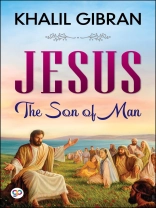Jesus : The Son of Man, a spiritually rejuvenating book where Gibran weaves a magic through his words and inspires readers with his narrative skill. In this book, Jesus is portrayed through the words of 77 contemporaries who knew him, including enemies and friends like the Syrians, Romans, Jews, Priests and Poets. Some are based on actual characters from the New Testament, some are created by Gibran. Upon a day in the spring of the year Jesus stood in the market-place of Jerusalem and He spoke to the multitudes of the kingdom of heaven. In this fascinating volume, Gibran presents a view of Jesus life from the perspective of his contemporaries. Regarded as a literary and political rebel, his romantic style was at the heart of the renaissance in modern Arabic literature.
About the Author:
Kahlil Gibran was a Lebanese-American artist, poet, and writer, born in 1883 in Lebanon and died in New York in 1931. As a young man he emigrated with his family to the United States where he studied art and began his literary career. In the Arab world, Gibran is regarded as a literary and political rebel. His romantic style was at the heart of a renaissance in modern Arabic literature, especially prose poetry, breaking away from the classical school. In Lebanon, he is still celebrated as a literary hero.
In his early teens, the artistry of Gibran’s drawings caught the eye of his teachers and he was introduced to the avant-garde Boston artist, photographer, and publisher Fred Holland Day, who encouraged and supported Gibran in his creative endeavors. A publisher used some of Gibran’s drawings for book covers in 1898, and Gibran held his first art exhibition in 1904 in Boston. In 1908, Gibran went to study art with Auguste Rodin in Paris for two years. He later studied art in Boston. While most of Gibran’s early writing was in Arabic, most of his work published after 1918 was in English.
He is chiefly known in the English-speaking world for his 1923 book ‘The Prophet’, an early example of inspirational fiction including a series of philosophical essays written in poetic English prose. The book sold well despite a cool critical reception, gaining popularity in the 1930s and again especially in the 1960s counterculture. Gibran is the third best-selling poet of all time, behind Shakespeare and Lao-Tzu.







![Cover of Brian Schrag & Julisa Rowe: Community Arts for God's Purposes [Chinese] 貼近神心意的社群藝術 Cover of Brian Schrag & Julisa Rowe: Community Arts for God's Purposes [Chinese] 貼近神心意的社群藝術](https://static.worldofdigitals.com/thumb_webp/740/9781645083740.webp)




